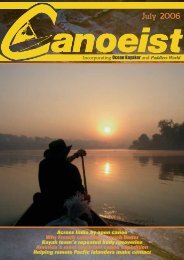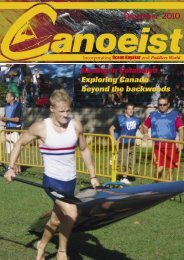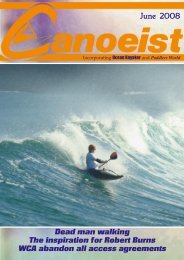November 2006 - Canoeist Magazine
November 2006 - Canoeist Magazine
November 2006 - Canoeist Magazine
You also want an ePaper? Increase the reach of your titles
YUMPU automatically turns print PDFs into web optimized ePapers that Google loves.
Half an<br />
argument<br />
Apparently, EA rod<br />
licence cards carry a<br />
telephone number<br />
for anglers to report<br />
conflicts with<br />
canoeists. They don’t<br />
ask canoeists to put<br />
their side of the<br />
case. Thus, the EA<br />
only receive a one<br />
sided story, OK as<br />
long as everyone is<br />
clear that a biased<br />
picture is being<br />
created.<br />
Welsh access seminar<br />
The WCA have hosted an access seminar at the<br />
Tryweryn, attended by the BMC, Ramblers’<br />
Association, RYA, Cambrian Caving Council,<br />
River & Lake Swimming Association,<br />
International Mountain Biking Association, Cycle<br />
Touring Club, CCPR and canoeists. Most thought<br />
it positive. This approach is long overdue despite<br />
the fact that it is what changed Scotland’s access<br />
laws.<br />
* The disparate interests being pulled together<br />
to fight the canal funding cuts form the first<br />
attempt at a similar grouping in England and<br />
maybe something bigger could emerge than just<br />
the resolution of the current DEFRA funding<br />
crisis.<br />
Marine Bill consultation<br />
Although <strong>Canoeist</strong> is on the DEFRA mailing list, no information on the<br />
Marine Bill consultation was obtained until after the consultation closed. An<br />
ISKA response addressing many of the questions was hastily assembled as<br />
indicated here. I am assured the policy team will consider these points although<br />
the ISKA name will not appear in the consultation document.<br />
Response on behalf of the<br />
International Sea Kayak Association.<br />
The lack of detail means that worst case situations must be<br />
considered, especially where there are similar situations already in<br />
existence elsewhere. The situation on rivers and the refusal to give<br />
straight answers on DEFRA’s coastal access study do not give<br />
confidence on the outcome of this study, regardless of anything that<br />
might eventually be promised. Get the situation resolved on rivers and<br />
there will be more confidence in the motives of legislators with respect<br />
to the sea.<br />
Q1 Spacial planning is only required for those activities which cause<br />
damage or danger. Regulation for the sake of it is unacceptable. For<br />
sea kayaks the sea offers ‘a special kind of freedom’, to quote an<br />
expression which has been used for decades. Regulation is the last<br />
thing wanted by outdoor activities enthusiasts and those who want to<br />
leave their regulated working lives behind. It would be contrary to the<br />
line taken for ramblers with the CRoW Act, where regulation is being<br />
eased.<br />
Q3 On rivers the Environment Agency have a statutory duty to<br />
promote navigation and have shown that canoes do not have<br />
significant impact on wildlife yet 98% of rivers remain closed at all<br />
times to small environmentally friendly craft, virtually no improvement<br />
has been seen in recent decades and little improvement is foreseen in<br />
the future. There is suspicion that this bill is intended to include similar<br />
unnecessary restrictions on the sea. Where there are local problems, by<br />
laws should be able to address them or legislation should address<br />
specific issues rather placing widespread constraint on the boating<br />
public.<br />
Q4 Opposed to marine spacial planning. Once the option exists<br />
there will be legislators who will abuse it, as is widespread on rivers.<br />
Where activities create genuine concerns, eg firing ranges, oil or<br />
nuclear pollution or excessively noisy craft, they should be restricted at<br />
national level to avoid a NIMBY approach by local authorities.<br />
Making noisy craft go elsewhere usually results in increased travel, fuel<br />
usage and other environment damaging results, as well as the noise<br />
problem for their new hosts.<br />
Q6 River Basin Management Plans are a prime example of how<br />
zoning can be abused and be unacceptable.<br />
Q7 There will be increased burden on regulators, businesses and<br />
especially those regulated.<br />
Q11 The abuse of the use of rivers by the Environment Agency, the<br />
access situation in England and Wales being the most repressive of any<br />
country in the world, should be a warning to all and no action should<br />
be taken which would permit such policy.<br />
16<br />
CANOEIST <strong>November</strong> <strong>2006</strong><br />
Dee agreement rejected<br />
An agreement has been reached between Dee Anglers<br />
and the Dee Valley Users Group but it has been rejected<br />
by the WCA and BCU as unacceptable as it is only for a<br />
few days per year and does not permit public access.<br />
WCA access officer Ashley Charlwood suggests the<br />
DVUG are a secretive body with competition interests. If<br />
so, they should be identifiable by the WCA and BCU,<br />
who have effective control of all competition. Blackleg<br />
action of this king undermines the strictures that much<br />
larger numbers of recreational paddlers have endured over<br />
recent years in order to bring pressure to bear and pull the<br />
problem into public view, now happening in Wales with<br />
discussion up to Assembly level. A WCA statement says<br />
they ‘can only endorse sustainable and liberal agreements.<br />
This is not one of those arrangements.’<br />
Q14 Spacial restrictions for specific activities should only be<br />
undertaken by national bodies with full technical knowledge. Local<br />
councils banning people because they think wildlife is more<br />
important, even if disturbance is not actually caused, is the complete<br />
antithesis of that position. Take, for example, opposition to increase<br />
in the number of yachts on the Crouch in case it disturbs the birds at<br />
the mouth of the river, which currently live comfortably with 10,000<br />
yachts based on the river. Many authorities are unaware that people<br />
on foot cause more disturbance to wildlife than do people in boats or<br />
even on horseback or that people remaining in one place cause more<br />
disturbance than people moving past and leaving the area. Many<br />
creatures seek out human activity, such as gulls around rubbish tips<br />
and fishing vessels or dolphins seeking fish congregating around<br />
outfalls whereas clean water has less wildlife, eg L Ness. Wildlife needs<br />
to be alert for dangers; keeping people away to avoid disturbance is<br />
not a natural situation unless the disturbance is excessive.<br />
Q15 Generally opposed to spacial restrictions.<br />
Q17 This should only be done at national level, when genuinely<br />
required, to avoid the NIMBY approach.<br />
Q18 Activities with the potential to cause serious damage or<br />
danger, such as active firing ranges or nuclear or oil pollution, not<br />
activities which simply fail to give wildlife or favoured users total<br />
precedence.<br />
Q19 Legislation should only address real problems and be updated<br />
as required rather than giving blanket powers to officials. On rivers<br />
the Environment Agency are building up a folio of threats such as<br />
charging licence fees and imposing third party insurance where they<br />
are not required at present even though they say they will probably<br />
not use them in the short term. Authorities should not be given<br />
powers just-in-case, especially when they have poor track records<br />
with existing powers.<br />
Q20 All relevant data should be made available. Contrast this with<br />
the Environment Agency paper Effects of Canoeing on Fish Stocks &<br />
Angling which does not support the EA’s policies on river usage, is<br />
reported to have disappeared from their library and is extremely<br />
difficult for interested parties to obtain.<br />
Q23 Preferred areas are another term for education and are quite<br />
acceptable if well founded, especially if there is a two way information<br />
flow which allows the educators to be told when they are incorrect.<br />
What one interest prefers may be different from what is preferred by<br />
others. Outright bans are not acceptable without very good reason.<br />
Q24 The idea of maps is abhorrent. They will give all the expense<br />
and problems which have resulted from the CRoW Act with the<br />
added complication that many users will not know precisely where<br />
they are on the sea. There are no hedgerows, footpaths or other<br />
guides. Areas such as water skiing zones may occasionally be buoyed<br />
but they are the minority. For example, there is nothing to mark the<br />
restricted zone fronting the nuclear submarine base on L Long while<br />
the light giving the leading line marking the northern end of the<br />
restricted area on the Gare Loch is almost impossible to see in daylight<br />
from sea level, particularly by a small craft launched at the north end





